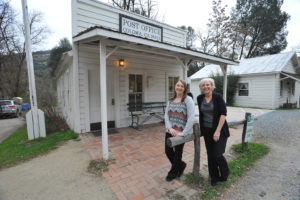 I’m excited to be a guest today at Southern Writers Magazine‘s author blog. View the post here.
I’m excited to be a guest today at Southern Writers Magazine‘s author blog. View the post here.

Since I am not a native of Northern California, my favorite thing to do on weekends is explore the area’s many small towns (I had no idea there were so many). It’s a happy surprise when you discover a new one, because when most people think of Northern California they think of San Francisco, Lake Tahoe, perhaps Silicon Valley or the Pacific Ocean, not well-preserved historic communities.
Not only do I enjoy exploring small towns, I also like to read stories that take place in small towns; and, the contemporary fiction stories that I write take place in small towns (where the town is one of the book’s characters).
So when I needed a place to set my story, THE HERMIT BOOKSTORE, I instantly thought of Lotus (population 295), a community that dates back to California’s gold rush days (165 years ago). Lotus has one main road, Lotus Road, a few old farmhouses, a friendly vibe, and lots of residual spirit energy left over from the California Gold Rush.
THE HERMIT BOOKSTORE is a modern day story that evolves over the span of a week in April 2014. The story is about a mysterious bookstore that suddenly appears on Lotus Road where an old farmhouse used to be. There’s a quirky bookstore owner, Jolene, who meets three people who live in Lotus. These three characters need to fix a piece of their life but can’t seem to do it without a little push. Jolene happens to know what they need and how to push them in the right direction.
If you also enjoy small towns and would like to read about California’s oldest continuously functioning post office that you can still visit today in Coloma (around the corner from Lotus), go to “Coloma post office still delivering mail after 165 years.”
Anyone can write. Here are 8 ways to write better fiction.
#1 – To write a great story, forget all the rules and just write. Write every day. Visit the story every day, even if it’s only to write one sentence. Keep at it until you reach the end. Then edit like crazy.
#2 – Look for story and character ideas in everything you do — books you read, movies and TV programs you watch, people you talk to, and while eavesdropping in public. Being observant is a very important characteristic of a writer.
#3 – The job of each chapter is to encourage readers to want to read the next chapter. That means revealing details slowly, just enough to build suspense so the reader wants to know what will happen next.
#4 – If you allow yourself to think about all the things that go into a novel — characters, themes, place, plot(s), ending — you’ll get overwhelmed. Instead, break it down into smaller tasks. First develop the story’s theme. Then develop the characters and where the story will take place. The rest will likely come during the writing and editing process.
#5 – Write what you want to write, not what someone else recommends because it’s a popular genre.
#6 – Your research material will add depth and richness to your story. Learn to love the research process.
#7 – Don’t worry if your story isn’t long enough. The story will find its own natural length. If parts of the story need more, you’ll know it. If it has too much filler, you’ll know that too. Most readers like tight, efficient stories and don’t like rambling.
#8 – Get out into the world. Interact with it. Travel. Meet new people. It will all become part of your stories.